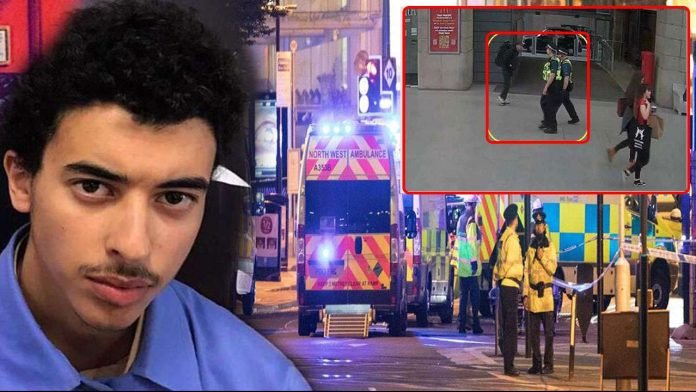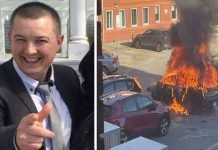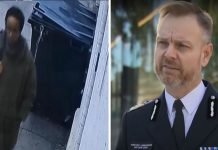Manchester Arena bomber Salman Abedi should have been identified as a threat on the night of the attack, inquiry finds
Twenty-two people murdered in the Manchester Arena bomb were “failed on every level” by organisations criticised in a public inquiry report, a victim’s father has said.
Martyn Hett’s father said the attack “should have been prevented”.
Paul Hett, whose 29-year-old son died in the bombing, said it had been heartbreaking “to find that Martyn had just been in the wrong place at the wrong time”.
Mr Hett said the organisations involved had a duty of care to protect his son and the other victims, adding: “This inquiry has rightly found that we were failed by them on every level.”
“This atrocity should and could have been prevented, and 22 people would not have lost their lives,” he said.
Sir John said it was likely Abedi would have detonated his device if confronted but “the loss of life and injury is highly likely to have been less”.
Manchester Arena bomber Salman Abedi should have been identified as a threat on the night of his attack – and it is “highly likely” more lives could have been saved, an inquiry has found.

Sir John Saunders found there were missed opportunities to avert or minimise the “devastating impact”.
In a damning first report from the inquiry, Sir John said the arena’s operator SMG, security company Showsec and British Transport Police (BTP) were “principally responsible for the missed opportunities” – but there were also “failings by individuals”.
He said the “most striking missed opportunity” was that a member of the public, Christopher Wild, raised concerns about Abedi to security guard Mohammed Agha minutes before the bombing – but the effect of the steward’s actions “was to fob (Mr Wild) off”.
Sir John said: “The security arrangements for the Manchester Arena… should have prevented or minimised the devastating impact of the attack. They failed to do so.
“There were a number of opportunities which were missed leading to this failure.
“Salman Abedi should have been identified on 22 May 2017 as a threat by those responsible for the security of the arena and a disruptive intervention undertaken.
“Had that occurred, I consider it likely that Abedi would still have detonated his device, but the loss of life and injury is highly likely to have been less.”
The missed opportunities set out by the inquiry included:
• The actions of security guard Kyle Lawler who tried to use his radio to alert the security control room after concerns were raised about Abedi but could not get through, before he left the foyer “unconcerned”. Mr Lawler told the inquiry he had a “bad feeling” about Abedi but did not approach him for fear of being branded a racist
• SMG’s “inadequate” CCTV system that left a blind spot allowing Abedi to hide for an hour in the foyer of the arena before he blew himself up
• No “adequate security patrol” by Showsec in the foyer of the arena for 30 minutes before the attack, as Abedi hid out of sight from CCTV cameras
• Mr Agha failing to notice Abedi acting suspiciously in the foyer of the arena about an hour before the attack after Showsec did not adequately train him
The inquiry heard none of the four BTP officers on patrol were in the arena’s foyer at the time of the attack – despite instructions that one officer should be positioned there at the end of the concert.
Sir John said a “competent BTP officer would have taken action that could have saved lives”, had one of the officers been in the foyer instead of leaving it unattended after 10pm.
Two of the officers, PC Jessica Bullough and PCSO Mark Renshaw took a two-hour meal break that evening – which included a five-mile trip for a kebab – which PC Bullough told the inquiry was “unacceptable”.

Among nine recommendations in his report, Sir John said a “Protect Duty” for better security at venues should be written into law, following a campaign from the mother of victim Martyn Hett.
The inquiry chairman said Mr Wild had been “very responsible” to alert security after forming the view that Abedi might “let a bomb off”.
“That was sadly all too prescient and makes all the more distressing the fact that no effective steps were taken as a result of the efforts made by Christopher Wild,” he added.
Sir John described the terror attack as a “wicked act inspired by distorted ideology of the so-called Islamic State”.
He said that the responsibility for the attack lies with Abedi and his younger brother Hashem, who was jailed for life for helping plan the atrocity, but his inquiry had to decide “whether more could and should have been done” to stop the bomber.

The retired High Court judge said he was “urged by everyone to avoid looking for scapegoats” and insisted he had “not looked to blame anyone”.
But he said where “individuals have fallen below the proper standard of carrying out their roles of protecting concertgoers I have said so”.
In response to the report, SMG said it was “committed to working with the inquiry to help the families of victims and survivors better understand the events of that evening, as well as look at the lessons learnt”.
The arena’s operator said it would be reviewing the findings and recommendations and “any additional actions we should take, we will take as we continuously challenge ourselves to be better”.
BTP Chief Constable Lucy D’Orsi said the force would be “carefully reviewing the findings”, and that it has been examining “procedures, operational planning and training since this dreadful attack took place in 2017”.
Greater Manchester mayor Andy Burnham said “all of the organisations involved on the night owe it to them to face up fully to Sir John’s findings, to take responsibility and make the changes needed to prevent others going through what they have been going through these last four years”.
“There are wider lessons for us all,” he said.
“It is sadly clear that the country was under-prepared for an attack of this nature outside London and that security arrangements at large-scale events were insufficient.”
Mr Burnham added that he was “encouraged” by the recommendation for an overhaul of the law on venue security and that the legislation would be known in the region as Martyn’s Law – after the campaigning by Martyn Hett’s mother.
The father of 29-year-old Martyn said his son had been “in the wrong place at the wrong time” and that the family’s lives had been “torn apart” by his death.
“We entrusted the lives of our loved ones to organisations who we believed had a duty of care to protect them,” said Paul Hett.
“This inquiry has rightly found that we were failed by them on every level.
“This atrocity should and could have been prevented, and 22 people would not have lost their lives.”
The inquiry’s report is the first of three being published in the coming months.
A further report will follow on the emergency response and the experience of each of those who died, and finally an analysis of whether the atrocity committed by Abedi could have been prevented.
Analysis: Learning from mistakes of Manchester Arena attack can be its legacy
By Tom Parmenter, north of England correspondent
The responsibility for the Manchester bomb lies with the 22-year old who detonated it and his younger brother who helped build it. That’s not in doubt.
The point of understanding what happened and what went wrong is to ensure something meaningful and tangible can come from the horrific night in May 2017 that is seared into the collective memory of this city.
Taken together, the series of security lapses on the night of the attack mean that, in the inquiry chairman’s view, it is “highly likely” lives could have been saved.
The suicide bomber would still probably have detonated his bomb – but if the security operation had done its job, he would have been monitored while acting suspiciously and potentially challenged.
Had police officers been in the foyer, as per their orders, it would have been them being alerted by a member of the public rather than poorly trained security teams who had radios that failed them.
Arena management could have closed the doors so that fewer people would have been in the foyer where he ultimately detonated the device at 10:31pm.
The word “if” is used repeatedly throughout today’s report.
Sadly nothing changes the hard facts of what happened over four years ago. It is through truly learning from the mistakes that contributed to the 22 deaths, and the appalling injuries people suffered, that can be the legacy of the attack.
It is the least that the victims of the cowardly terrorist deserve.

Support Independent Journalism Today
Our unwavering dedication is to provide you with unbiased news, diverse perspectives, and insightful opinions. We're on a mission to ensure that those in positions of power are held accountable for their actions, but we can't do it alone. Labour Heartlands is primarily funded by me, Paul Knaggs, and by the generous contributions of readers like you. Your donations keep us going and help us uphold the principles of independent journalism. Join us in our quest for truth, transparency, and accountability – donate today and be a part of our mission!
Like everyone else, we're facing challenges, and we need your help to stay online and continue providing crucial journalism. Every contribution, no matter how small, goes a long way in helping us thrive. By becoming one of our donors, you become a vital part of our mission to uncover the truth and uphold the values of democracy.
While we maintain our independence from political affiliations, we stand united against corruption, injustice, and the erosion of free speech, truth, and democracy. We believe in the power of accurate information in a democracy, and we consider facts non-negotiable.
Your support, no matter the amount, can make a significant impact. Together, we can make a difference and continue our journey toward a more informed and just society.
Thank you for supporting Labour Heartlands












